FIND THE VOLUME OF A PYRAMID
Subscribe to our ▶️ YouTube channel 🔴 for the latest videos, updates, and tips.
What is a pyramid ?
A 3-dimemsional shape formed by joining all the corners of a polygon to a central point or apex is named as a pyramid.
The base of a pyramid maybe of any shape such as triangle, square, rectangle, hexagonal, etc..
What is volume of a pyramid ?
The volume V of a pyramid is one-third the area of the base B times the height h.
That is,
Volume = 1/3(area of base × height)
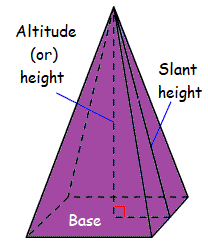
Find the volume of the following :
Problem 1 :
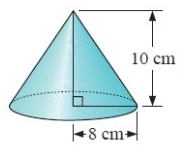
Solution :
By observing the figure, it is a cone.
Here area of base is the shape of the circle.
To find the volume,
Volume = 1/3(area of base × height)
= 1/3(area of circle × height)
= 1/3(πr2 × height)
we have,
radius (r) = 8 cm and height (h) = 10 cm
= 1/3(π82 × 10)
= 1/3(2009.6)
Volume = 670 cm3
Problem 2 :
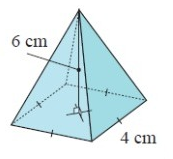
Solution :
By observing the figure, it is a square-based pyramid.
Here area of base is the shape of the square.
To find the volume,
Volume = 1/3(area of base × height)
= 1/3(area of square × height)
= 1/3(s2 × height)
we have,
side (s) = 4 cm and height (h) = 6 cm
= 1/3(42 × 6)
= 1/3(96)
Volume = 32 cm3
Problem 3 :
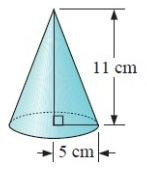
Solution :
By observing the figure, it is a cone.
Here area of base is the shape of the circle.
To find the volume,
Volume = 1/3(area of base × height)
= 1/3(area of circle × height)
= 1/3(πr2 × height)
we have,
radius (r) = 5 cm and height (h) = 11 cm
= 1/3(π52 × 11)
= 1/3(863.5)
Volume = 288 cm3
Problem 4 :
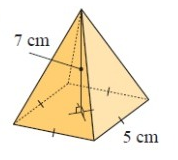
Solution :
By observing the figure, it is a square-based pyramid.
Here area of base is the shape of the square.
To find the volume,
Volume = 1/3(area of base × height)
= 1/3(area of square × height)
= 1/3(s2 × height)
we have,
side (s) = 5 cm and height (h) = 7 cm
= 1/3(52 × 7)
= 1/3(175)
Volume = 58.3 cm3
Problem 5 :
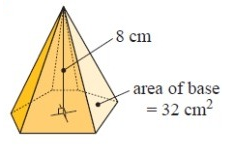
Solution :
By observing the figure, it is a hexagonal pyramid.
Here area of base is the shape of the hexagonal.
To find the volume,
Volume = 1/3(area of base × height)
we have,
area = 32 cm2 and height (h) = 8 cm
= 1/3(32 × 8)
= 1/3(256)
Volume = 85.3 cm3
Problem 6 :
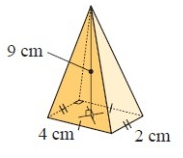
Solution :
By observing the figure, it is a rectangle-based pyramid.
Here area of base is the shape of the rectangle.
To find the volume,
Volume = 1/3(area of base × height)
= 1/3(area of rectangle × height)
= 1/3(length × width × height)
we have,
length (l) = 4 cm, width (w) = 2 cm and height (h) = 9 cm
= 1/3(4 × 2 × 9)
= 1/3(72)
Volume = 24 cm3
Problem 7 :
A square-based pyramid has a base with side length 8 cm. The height of the pyramid is 11 cm. Calculate the volume of the pyramid.
Solution :
Side length of pyramid = 8 cm
Area of pyramid = a2
= 82
= 64 cm2
Height = 11 cm
Volume of pyramid = (1/3) x base area x height
= (1/3) x 64 x 11
= 234.6 cm3
So, volume of the required square base pyramid is
234.3 cm3
Problem 7 :
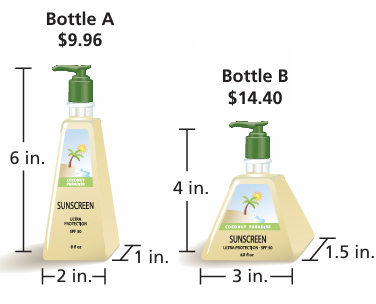
(a) How many times more sunscreen is in Bottle B than in Bottle A?
(b) Which is the better buy?
Solution :
By observing the capacity of sunscreen we can decide.
Quantity of sunscreen in Bottle A :
= (1/3) x base area x height
= (1/3) x (2 x 1) x 6
= (1/3) x 2 x 6
= 4 cubic inches
Quantity of sunscreen in Bottle B :
= (1/3) x base area x height
= (1/3) x (3 x 1.5) x 4
= (1/3) x 2 x 6
= 6 cubic inches.
= 6/4
= 1.5 times
Quantity of sunscreen in Bottle B is 1.5 more than quantity of sunscreen in Bottle A.
b) Cost of 1 square inches of sunscreen in bottle A
= 9.96/4
= $2.49
Cost of 1 square inches of sunscreen in bottle B
= 14.40/6
= $2.40
From this, the unit price of bottle B is lesser. Then buying Bottle B is the better buy.
Problem 8 :
In 1483, Leonardo da Vinci designed a parachute. It is believed that this was the first parachute ever designed. In a notebook, he wrote “If a man is provided with a length of gummed linen cloth with a length of 12 yards on each side and 12 yards high, he can jump from any great height whatsoever without injury.” Find the volume of air inside Leonardo’s parachute.
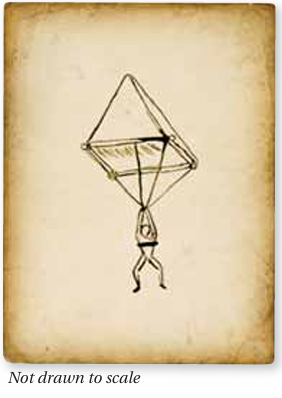
Solution :
Volume of pyramid = (1/3) x base area x height
= (1/3) x 12 x 12 x 12
= 4 x 12 x 12
= 576 cubic yards.
Problem 9 :
Do the two solids have the same volume? Explain.
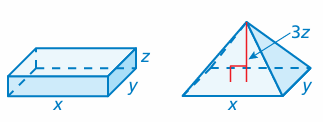
Solution :
Volume of rectangular prism = length x width x height
= x y z
Volume of pyramid = (1/3) xy (3z)
= xyz
Both rectangular prism and pyramid has same volume.
Problem 10 :
How much glass is needed to manufacture 1000 paperweights? Explain your reasoning.
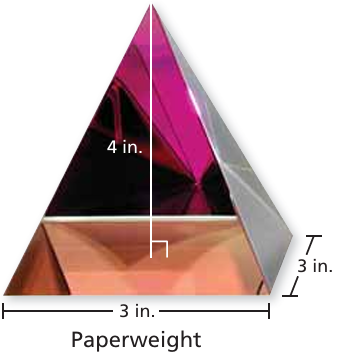
Solution :
Quantity of glass needed to make one paperweight
= (1/3) x 3 x 3 x 4
= 12 cubic inches
Quantity of glass needed to make 1000 = 12 x 1000
= 12000 cubic inches.
Subscribe to our ▶️ YouTube channel 🔴 for the latest videos, updates, and tips.
Kindly mail your feedback to v4formath@gmail.com
We always appreciate your feedback.
About Us | Contact Us | Privacy Policy
©All rights reserved. onlinemath4all.com

Recent Articles
-
SAT Math Problems and Solutions
Feb 14, 26 06:05 AM
SAT Math Problems and Solutions -
SAT Math Practice Questions with Answers
Feb 14, 26 05:47 AM
SAT Math Practice Questions with Answers -
SAT Math Practice Test with Answers
Feb 14, 26 02:30 AM
SAT Math Practice Test with Answers

